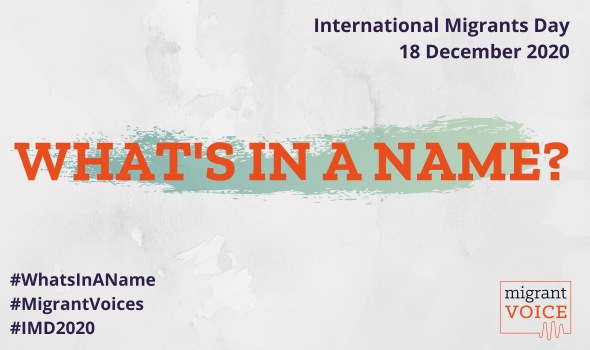What's in a name?
What's in a name?

On International Migrants Day 2020, Migrant Voice is celebrating our names and everything that they mean. But what, exactly, is in a name?
English poet and playwright William Shakespeare was quick to dismiss the importance of names in his famous play Romeo and Juliet, a tragedy about two young people in love. A rose “would smell as sweet” even if we called it something else, we read in that play.
Shakespeare wasn’t wrong: if you think about the English word ‘rose’, and then picture it in any other language that you speak (rosa, roos, ròs, warda…), you’ll still picture the same beautiful flower.
But Shakespeare knew that things get a bit messier when names belong to people and not objects. When the play’s heroine says that famous line, she is referring to Romeo’s surname – which marks him as a member of family that is the enemy of her own. She tries to dismiss its relevance and persuade both herself and Romeo that his name, and what it means, doesn’t matter. But she was wrong and the play ends in tragedy for them both.
Names do matter, but we use them so often and so nonchalantly that many people rarely stop and think about them. Yet we migrants and descendants of migrants who retain that heritage in our names are often reminded of our names more often than we’d like.
Our names are mispronounced and misspelt; teachers look at them and sigh, “I’m not even going to try to say this”; friends and colleagues use an easier nickname, or an English name that sounds similar to the original.
We get used to the new pronunciation and the new nicknames; we learn to say, “Just call me…”; we anglicise the pronunciation of our foreign-sounding names. It’s no tragedy, of course. After all – what’s in a name?
Our names are one of our oldest possessions and often one of the first things we tell others about ourselves. They are also never just ours, as they are used by others to address us, talk to us, or about us; besides, we share our first, middle and last names with many other people.
Our names carry our history – literally in the form of a paper trail we create and leave in our wake, from birth certificates to passports, and from the covers of old schoolbooks to contracts, lists, letters and post-it note messages left on the fridge.
But they carry our history less literally too – they connect us to our roots by way of our family names, the ancestors after whom we were named, or simply our parents’ taste and choices. And sometimes, they can remind us of a journey across the world that we or the ones who came before us took.
So, what’s in a name? Our stories are in our names. Our families, our roots, our languages are too. The past versions of ourselves, however different they may be from our present selves, still shared our name: they are in there too.
On International Migrants Day, let’s celebrate our names, their histories and their meanings – let’s celebrate what they mean to us.
We’ve been asking our members to reflect on their names and we’re sharing their contributions across Twitter, Facebook and Instagram.
Why not tag us on Twitter, Facebook or Instagram and tell us what your name means to you?


